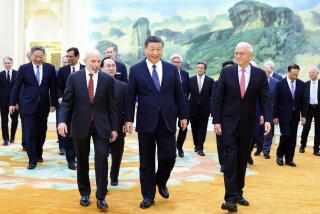Clinton Pitches China Pact to Silicon Valley Audience
SAN JOSE — President Clinton on Monday took his campaign for normal trade with China to the heart of the new economy, telling a Silicon Valley audience that “in the entire history of trade agreements, I don’t believe there’s ever been one this weighted in our favor.”
In his lengthiest and most energetic public pitch for the plan to date, the president argued that the pending vote in Congress “lowers no American trade barriers, lowers no American tariffs.”
Under a landmark pact between Washington and Beijing, China would open a wide range of its markets to outsiders, among them agriculture, automobiles and telecommunications. In exchange, Congress would grant China permanent normal trade status, rather than continuing to approve it one year at a time.
Both steps, in turn, would help pave the way for China to join the World Trade Organization, which enforces global trading rules and mediates disputes between nations. China is expected to join the WTO as early as this year.
Officials in Beijing have said they will not grant the United States the sweeping trade concessions they made last year unless Washington follows through with its pledge to give China permanent, normal trade status.
Under a normalized trading relationship, China would essentially gain a guarantee that it could sell its products in the U.S. at the same tariff rates as most other nations. Senate approval is expected, but the outlook in the House is uncertain and has become the focus of a major lobbying push by Clinton.
House Majority Leader Dick Armey (R-Texas) said in Washington on Monday that the House will vote on China’s trade status by the end of May. The White House had been pushing for a firm date, saying a later vote would risk miring the agreement in election-year politics.
The White House, meanwhile, announced that 40 state governors, including Gray Davis of California, and governors of three territories had signed a letter to House Speaker J. Dennis Hastert (R-Ill.) supporting the administration’s position and describing the vote as “critical to every state, commonwealth and territory of the United States.”
Much of the focus of the White House is on recalcitrant Democrats who have expressed the fear that expanded trade will leave American workers exposed to unequal competition with low-paid foreign workers. Opponents also argue that giving China permanent favorable access to U.S. markets would reward it for human rights violations.
“It’s very important that you understand this,” Clinton said of the danger of turning down the agreement. “The main consequence of this will be to hurt America economically and to dramatically strain our relations with China. . . . This is a big deal.”
The president spoke in the Tech Museum of Innovation in downtown San Jose before an audience largely from the Silicon Valley high-tech community. The event was sponsored by the Democratic Leadership Council, a Washington-based organization of centrist Democrats.
“If we do this, 20 years from now we will wonder why we ever had a serious debate about it,” the president said. “If we don’t do it, 20 years from now we’ll still be kicking ourselves for being so dumb.”
Among those who declared their support for normalized trade was Rep. Zoe Lofgren (D-San Jose), who represents Silicon Valley.
“The president is right,” she said, speaking just before Clinton. “Engaging China, exposing China to the sunlight of free market economics and democratic political values is the best way to bring about evolution toward freedom in China.”
Davis, noting that a quarter of California’s gross domestic product comes from trade, said: “The promise of new markets bodes well for agriculture, high-tech and manufacturing generally. Every human being from janitor to CEO will do better when . . . we adopt a normal trade relationship with China.”
Clinton and Davis also attended a fund-raiser Sunday night in San Jose that raised about $1 million for Democratic congressional candidates.
“It is absolutely critical,” said Irwin M. Jacobs, founder and chairman of Qualcomm Inc., who appeared on a panel led by Davis that focused on the need for improved education. “Let’s open [China] up but outrun everyone else.”
Times staff writers Jonathan Peterson in Washington and Dan Morain in San Jose contributed to this report.
More to Read
Sign up for Essential California
The most important California stories and recommendations in your inbox every morning.
You may occasionally receive promotional content from the Los Angeles Times.










